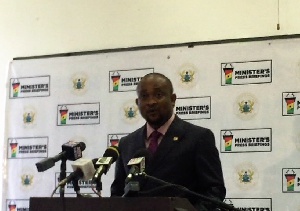Government has described as surprising the new position of the Ghana Medical Association (GMA) on the implementation of the drone delivery health system.
Addressing the media at a press briefing Wednesday, Deputy Information Minister, Pius Enam Hadzide disclosed government’s utter surprise at the GMA’s claims that the “proposed services to be provided by the drones do not conform to the primary healthcare policy in Ghana”.
According to him, the association initially embraced the initiative, thus its leadership’s change of mind is quite unexpected.
“The Ghana Medical Association welcomed the decision by government and to quote the General Secretary of the GMA Dr. Justice Yankson reaction to the announcement…[Well, for us as an association, on countless occasions, we have bemoaned the state of emergency medical service in the country, so if efforts are being made by the government to ensure we strengthen that aspect of our healthcare delivery, then we say kudos.] Government is therefore taken aback at the current position of the GMA,” Pius Hadzide said.
The Deputy Information Minister reiterated the relevance of the proposed drone delivery health system and urged stakeholders within the sector to support the initiative.
“The drone technology like other technology introduced into the health delivery system ladies and gentlemen fits well into the primary health care policy towards the achievement of universal health coverage. Government will want to once again urge stakeholders in the health sector to support the smooth run of the Drone Health Delivery System which received parliamentary approval yesterday,” he added.
He highlighted government’s commitment to ensuring “effective health care delivery in the country especially in rural areas” with the belief that “the Drone Health Delivery System will largely make an impact aside other measures to improve the health sector.”
The Ghana Medical Association released a statement on Tuesday evening, asking government to suspend the proposed drones medical deliveries deal.
The GMA claimed that though it was not completely against the use of drones, it should be noted that different levels of care have different capacities to perform specific functions. "The use of drones without the necessary improvement in the human resource capacity will not inure to the health benefit of the country and its quest to improve health care delivery," the GMA said.
Ghana seeks to use a drone delivery network, which will be run by the GHS and the Ministry of Health, to give Ghana the most advanced healthcare supply chain in the subregion.
The drones will operate 24 hours a day from 4 distribution centres across the country. The distribution centres will stock 184 life-saving and essential medical supplies including emergency blood and oxytocin to save women's lives in childbirth.
General News of Wednesday, 12 December 2018
Source: www.ghanaweb.com

















